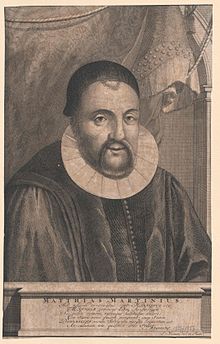Matthias Martinius
Matthias Martinius , also Matthias Martini (* 1572 in Freienhagen , Waldeck district; † December 30, 1630 in Kirchtimke near Bremen ), was a German Protestant (first Lutheran , then Reformed ) theologian and philologist .
Life
Martini, son of the judge from Freienhagen. Jonas Martini († approx. 1595/96) began studying theology at the High School in Herborn in 1589 after attending the Korbach high school and the pedagogy in Herborn . Here he accepted the reformed faith. He was particularly influenced by Bernhard Textor , with whom he disputed in 1592.
Since 1596 teacher of the high school, from 1597 Martinius undertook a long trip to the Netherlands (visiting the University of Leiden and the Hague Court of Prince Moritz of Orange ) and to Northern Germany with the Wittgenstein Count sons, whose preceptor he had already been during his studies .
After his return he was appointed pedagogue archen and adjunct of the city pastor in Siegen in 1598 . In addition to controversial theological writings, he - a representative of the Ramist philosophy of science - placed the school-pedagogical element with a holistic educational goal in the foreground. He played a key role in the German translation of the Bible by Johannes Piscator , and also gave lectures in exegesis , Hebrew studies , metaphysics , ethics and logic . One of his most important students was the later Herborn professor Johann Heinrich Alsted .
In 1607 he took over a pastor's position in Emden in East Friesland , in 1610 he became rector of the Bremen Gymnasium Illustre and professor of theology at the Gymnasium Bremen , which he expanded based on the Herborn model and which he also made famous.
He took part in the Dordrecht Synod in 1618/19 .
Martinius was the author of philological works, including the frequently reissued " Graecae linguae fundamenta " and the " Lexicon philologicum ". Thanks to his good connections to the Bohemian Brethren Church and through his pupil Johann Heinrich Alsted , he made a decisive contribution to the spiritual formation of Johann Amos Comenius , the founder of pedagogy . His philological works enjoyed high recognition at Dutch universities until the early 18th century and retained their value - for example in the case of Finno-Ugric - into the 20th century .
literature
- Friedrich Wilhelm Cuno: Martini, Matthias . In: Allgemeine Deutsche Biographie (ADB). Volume 20, Duncker & Humblot, Leipzig 1884, p. 514.
- Gerhard Menk : Martinius, Matthias. In: New German Biography (NDB). Volume 16, Duncker & Humblot, Berlin 1990, ISBN 3-428-00197-4 , pp. 305-307 ( digitized version ).
- Otto Renkhoff: Nassau biography . Wiesbaden, 1992, p. 495.
Web links
| personal data | |
|---|---|
| SURNAME | Martinius, Matthias |
| ALTERNATIVE NAMES | Martini, Matthias |
| BRIEF DESCRIPTION | German Protestant (first Lutheran, then Reformed) theologian and philologist |
| DATE OF BIRTH | 1572 |
| PLACE OF BIRTH | Freienhagen , Waldeck district |
| DATE OF DEATH | December 30, 1630 |
| Place of death | Kirchtimke near Bremen |
